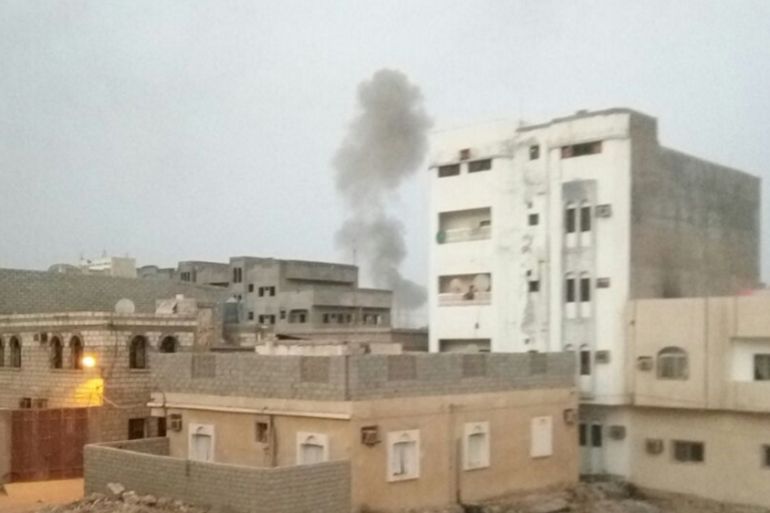Suicide attacks kill fasting Yemeni soldiers in Mukalla
Suicide bombers posing as Iftar distributors kill at least 38 Yemeni soldiers and injure 24 in Yemen’s southeast.

A wave of suicide bombings has killed at least 38 Yemeni soldiers in the country’s southeast, just as they were about to break their fast during the holy Muslim month of Ramadan, local sources say.
Four bombings hit security checkpoints in the coastal city of Mukalla at sunset on Monday, the local news agency Mukalla Now said.
Fighters pledging allegiance to the Islamic State of Iraq and the Levant (ISIL, also known as ISIS) group claimed responsibility for the attacks.
According to the news agency, another 24 people, including women and children, were injured in the blasts, with the city’s main Ibn Sina Hospital broadcasting urgent appeals for blood donations.
A local journalist, speaking on condition of anonymity, told Al Jazeera the attackers were posing as distributors for the fast-breaking meal, Iftar, and carried out the bombings while handing out food to troops who had spent the day fasting.
READ MORE: Meet the man using Facebook to help Yemen’s destitute
He told Al Jazeera that one of the attackers detonated his suicide vest at a checkpoint in a western area of the city, while the other three attacks took place in downtown Mukalla.
|
|
The last blast caused the most damage, he said, as one of the attackers forced his way through to an area where the soldiers were preparing to eat before blowing himself up.
A security official told the AFP news agency that the dead troops were from the Hadhrami Elite units, a recently formed local force which, backed by Gulf troops, recaptured Mukalla from al-Qaeda in April.
Both ISIL and al-Qaeda have expanded operations during Yemen’s civil war, and have claimed responsibility for several bombings and suicide attacks in Mukalla and the southern port city of Aden.
But over the past few months, government and Saudi-coalition forces have hit back, driving the armed fighters out of Mukalla, the capital of Hadramawt province, which al-Qaeda controlled for a year.
READ MORE: Q&A with the man who defeated al-Qaeda in Yemen’s Mukalla
There has been mounting international pressure to end the war on Yemen, which the UN estimates has killed more than 6,400 people and displaced more than 2.8 million.
The 15-month conflict has taken a horrifying toll on the country’s youth, with UNICEF warning that an estimated 320,000 children face life-threatening malnutrition.
It also estimates that 82 percent of the population is now in desperate need of humanitarian aid, with nearly half of Yemen’s 22 provinces on the verge of famine.
Saudi Arabia and a coalition of Gulf Arab countries launched an air campaign in March 2015 to push back the Houthis, but the rebels still control the capital and many parts of the country.
The Houthis, who claim to champion the interests of the beleaguered Zaidi Shia community, insist they are fighting to defend themselves against government aggression and marginalisation.